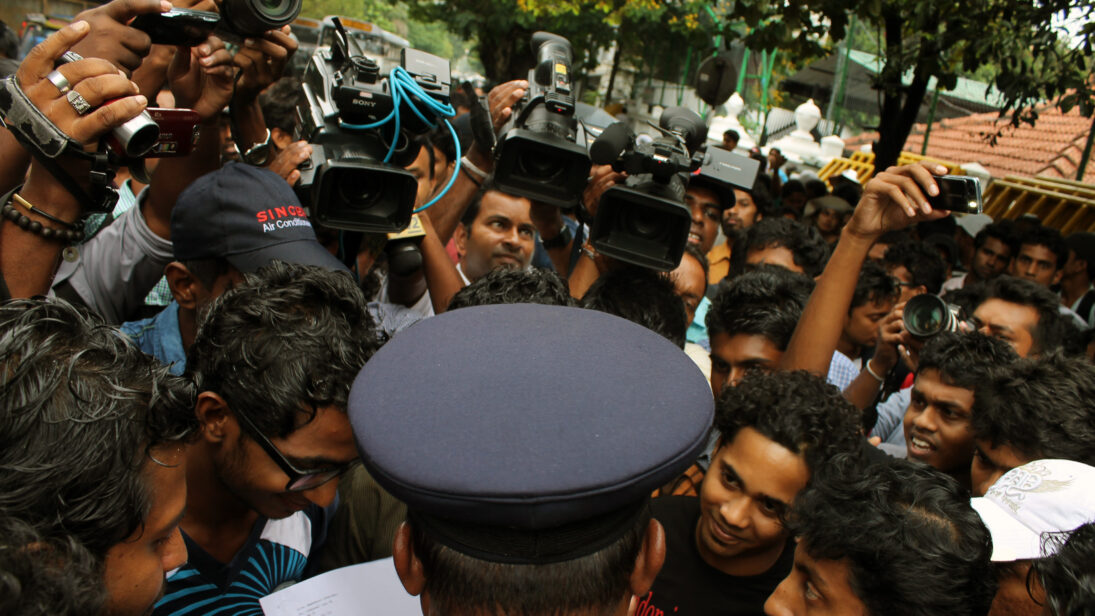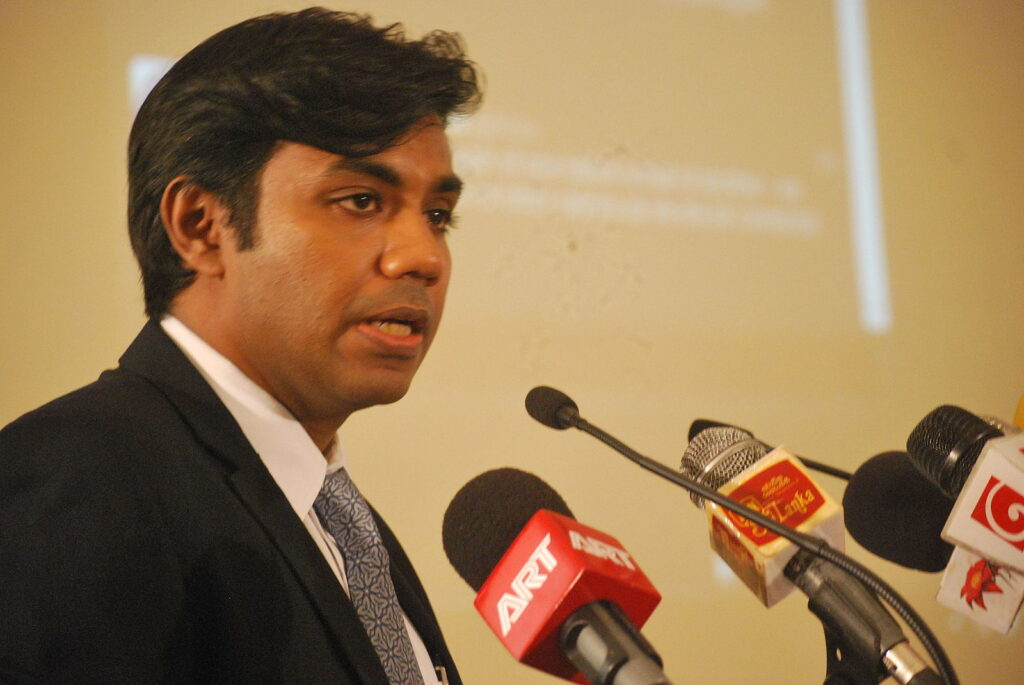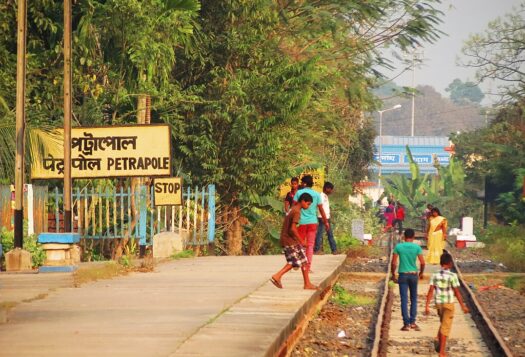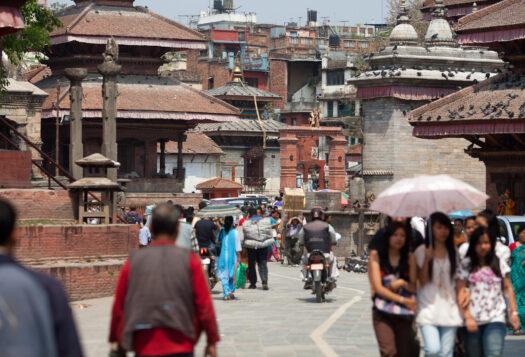
On April 6, 2022, Asanga Abeyagoonasekera spoke with South Asian Voices Deputy Editor Sunaina Danziger and Associate Editor Isha Gupta on the current economic crisis in Sri Lanka, including its implications for Sri Lanka’s geopolitical alignments and growing public discontent with the ruling Rajapaksa family. Mr. Abeyagoonasekera is an international security and geopolitics analyst and strategic advisor from Sri Lanka. He is a Senior Fellow at the Millennium Project Washington DC, a Fellow at (NESA) National Defence University (US), and a Fellow at APCSS (Hawaii). He recently published “Conundrum of an Island,” on recent developments in the Indo-Pacific and the nature of China’s presence in Sri Lanka.
What led to the current economic crisis in Sri Lanka, and was it just a case of the government’s economic mismanagement? Or were there other factors at play?
There were multiple factors triggering the economic crisis, which has now become a political crisis. The sudden rupture into a political crisis with all the ministers resigning displayed the autocratic grip of the Rajapaksa clan, with the four of them controlling the country. Therefore, the senior ministers were afraid to voice their opinions.
You suddenly have 26 letters submitted for resignation, which show that they didn’t want to own the dysfunctionality. One of the biggest concerns, which I highlighted in my SAV 2021 review, is the ultranationalist policy prescription that caused the government to reject multiple assistance packages, including from the IMF.
We should have gone to the IMF sometime back. What kept the president and his cabinet away was the dominant ultranationalist policy prescription: thinking that IMF would take over the country and the economy, which created fear.
This is the same fear that I saw during the Millennium Challenge Corporation (MCC) grant, where the president appointed a committee that came up with a report saying the grant posed a significant national security threat due to its takeover of a transport corridor, which is absolutely not correct.
This ultranationalist policy prescription also rejected the Japanese Light Rail Transit (LRT) project and the East Container Terminal—swapping it to a Western Container Terminal—with the entire port coming to a standstill when union leaders spoke about geopolitics for the first time. This was very strange – union leaders don’t talk geopolitics. Were their hands tied by external parties like China? What we could see was that China’s expansion grew during the Rajapaksa regime.
This is a great transition to our next question: how might this crisis impact Sri Lanka’s geopolitical alignments, particularly its position in strategic competition between India and China in South Asia?
It will definitely affect Sri Lanka’s foreign policy. Although Sri Lanka speaks about a balanced foreign policy, the Rajapaksas practiced the China bandwagon foreign policy and sometimes hedged against India. For example, the foreign secretary mentioned that we have an “India First” foreign policy, but then he quickly corrected his position. I think the effect will be significant because this is a situation where China is not the only cause of the economic crisis. But one of the concerns, which is a considerable one, is that China will give one billion dollars to Sri Lanka to settle their own loans. This is the first time I have heard this model where you give loans to settle your own loans. Even what interest rates are nobody knows.
In response to autocracy and heavy corruption, the slogan, “Gota, Go Home,” has been frequently used in protests. However, this means that protestors are not only against Gotabaya but the family and its regime. They want the family out.
The opaqueness is a serious issue with Chinese loans, which is a question from the beginning, even from Hambantota to various projects. You can see from the large-scale commercial borrowings that those projects do not yield many returns. One of the first recommendations of the IMF is to restructure because Sri Lanka doesn’t have much revenue to function the economy due to tax cuts implemented during Gotabaya Rajapaksa’s administration and the multiple loans they have taken, which were all commercial loans.
India was one of the first countries to give Sri Lanka economic assistance: about USD $2. 5 billion was given during (Indian External Affairs Minister) Dr. Jaishankar’s visit recently for essentials.
But the problem is that many internal functions aren’t working right now. Even the shipments that come into the port take days to clear, which amounts to a lot of processing lag time while people continue to suffer. This could get into a serious and chaotic situation. I hope it will not get into an anarchic situation where people will not have direction and lose faith. Some of the protesters I interviewed said that they were out of the house because of economic hardship. They’re not there to elect somebody else, and they’re not there for the opposition. They are there because they are in pain. That’s why immediate assistance is required for Sri Lanka to stabilize the situation.
However, many countries are very cautious about getting involved. Even this morning, I had a conversation with an Indian media channel—they’re very cautious of coming in to assist because it has previously backfired due to accusations they are launching internal interventions.
While many have debunked “debt-trap diplomacy,” I have highlighted that Sri Lanka faces a strategic trap missing from the existing discourse on its relationship with China. The strategic trap has three elements to it. One is China’s assistance to the Rajapaksas’ political party, the Sri Lanka Podujana Peramuna (SLPP). China provides gradual assistance to move away from the democratic model to supporting an autocracy.
The second is the human rights aspect, of which the Sri Lankan case is a very clear example there. China supported Sri Lanka in the Human Rights Council during accusations of war crimes, and Sri Lanka supported China against allegations of human rights issues in Xinjiang. The third is China’s support for the Sri Lankan military and surveillance system.
People are angry and sad about their living conditions, and past foreign policy decisions definitely had an impact.
What do you think the political consequences of this economic crisis might be for President Gotabaya Rajapaksa (and the Rajapaksa family as a whole), and how do you think this is different from when they lost power in 2015?
In response to autocracy and heavy corruption, the slogan, “Gota, Go Home,” has been frequently used in protests. However, this means that protestors are not only against Gotabaya but the family and its regime. They want the family out.
Some of the Rajapaksa family have now taken refuge in other countries and others are still in Sri Lanka. But the situation is out of control because you have hundreds and thousands joining so many protests. You have multiple sectors coming together, such as teachers, judiciary members, farmers, and even mothers with small children—this is the first time I have seen this trend.
We had two youth (JVP) insurrections back in 1971 and 1988. But those insurrections were armed insurrections against the state, not people coming forward like this. I think this is an Arab Spring moment for Sri Lanka because the Arab Spring had three attributes: it was against autocratic regimes, corruption, and poverty. All three match Sri Lanka, which is an autocratic regime, has significant corruption, and poverty due to the economic crisis.

This time every single Sri Lankan is protesting. I think the economic crisis did trigger levels of poverty that impacted all classes of society. I think this time is completely different from other periods of social unrest in Sri Lanka – you can see this from social media, the protesters, and the young people. I might even say that the police might join the protestors. Their families are also affected by the situation. They don’t want to protect the Rajapaksas.
I don’t think there could ever be the comeback of a Rajapaksa unless whoever comes into the regime has to have some credibility in doing the work to address people’s concerns.
What implications might the current economic crisis have for democratic backsliding concerns in Sri Lanka, or other domestic issues such post-civil war transitional justice and reconciliation processes?
The economic crisis has impacted the entire society, institutions to function properly. Democratic backsliding is due to heavy power concentration toward the executive and one family and misusing power.
Sri Lanka requires immediate restoration of its democratic institutions. The 20th amendment to the Constitution gave most of the central powers to the president and took away the checks and balances and independent institutions. There is heavy political interference to judiciary acquitting many Rajapaksa cases and their close associates, auditor general, bribery commission and other sectors.
Post-war reconciliation has made no progress at all. The problem is that the government dismissed allegations of human rights abuses and even completely rejected the recommendations of the UN Human Rights Council.
Harassment, repression, and extrajudicial arrests have continued. During the protests, hundreds have been arrested under the Emergency and Prevention of Terrorism Act (PTA). The first thing the government did was accuse the protestors of creating a national security concern, saying that they were extremists. But what happened was the lawyers came forward to protect the detainees.
Sri Lankans need their voices to be heard as well as a genuine reconciliation process. The recommendations of the UN OHCHR need to be considered without rejection. I think invoking national security and labeling protestors as extremist doesn’t work anymore. I think the new generation would see it in a different perspective rather than an ultra-nationalist view, a more moderate view and would take this movement forward.
The Sri Lankan government only recently initiated talks with the IMF for financial assistance and has also reportedly sought out help from the World Bank. What other structural reforms can the Sri Lankan government take to get the country out of this economic crisis, or is this too little, too late?
The immediate measure to take is restoring electricity crisis. People are in darkness for up to 10 hours of power cuts, so the entire economy is not functioning. Foreign reserves have also dropped: it was less than two billion, so it’s dropping seriously. There were affects from the pandemic on remittances, as well as the income generated from tourism. The significant drop in foreign reserves is a serious issue.
We must stabilize the situation—that’s why I mentioned the IMF previously. You also need to bring back a proper taxing system because it’s been reduced. We don’t have money. A lot of economists gave warnings that we might even default and advocated working on it earlier, but I think immediate measures have to be taken to correct those situations. Basic essentials, like medicine, also have to go to people.
Here is a situation where you don’t have a functioning government. And who makes the decisions? The president alone cannot make the decisions, he needs a cabinet and institutions in place. But the protestors are telling the President to go home; they want to remove him.
The riots have to be controlled because if it goes out of control it can become an anarchic situation. South Asian countries have a historic pattern of heavy militarization, and military governments can come in, which could be the case in Sri Lanka.
It’s dangerous, but the democratic system and norms are still functioning, so you need to assist them. Other countries should assist Sri Lanka with that now because, without assistance, I don’t think we can stabilize this situation. Sri Lanka is not rejecting anything, they want assistance.
In the financial sector, how do you bring back normalcy? The IMF’s immediate recommendations have to be followed without borrowing more money.
The processes need transparency, stating how much of foreign borrowings and what are their interest rates, how do we generate revenue from already built massive infrastructure projects, national planning requires more strength to pre-evaluate projects, we should not allow unsolicited proposals avoiding competitive bidding and there are so many areas that require immediate attention. I understand that a new Central Bank governor, Nandalal Weerasinghe, has been appointed. He’s been with the Central Bank for the past 30 years and has a lot of experience. The country needs to stabilize and get back to normal, that’s the immediate concern.
Sri Lanka is ready to receive help from all parties. We received USD $2.5 billion from China and a USD $1 billion credit line from India as well as other countries. But now, we don’t have a finance minister in Sri Lanka. Here is a situation where you don’t have a functioning government. And who makes the decisions? The president alone cannot make the decisions, he needs a cabinet and institutions in place. But the protestors are telling the President to go home; they want to remove him.
Editor’s Note: This article is part of two-part Q&A series with Asanga Abeyagoonasekera examining the ongoing Sri Lankan economic crisis. Read part two here.
***
Image 1: Vikalpa via Flickr
Image 2: Sarvodaya Shramadana Movement via Wikimedia Commons


